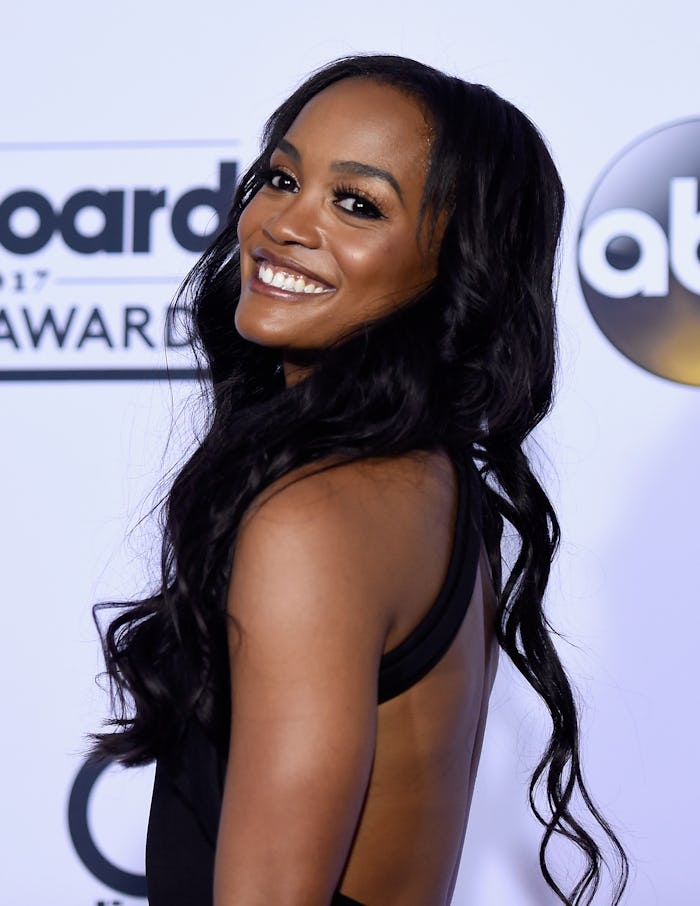Entertainment

There's A Big Problem With The New 'Bachelorette'
I was never a fan of The Bachelor franchise, in large part because the show's glaring diversity issues were obvious within the first 10 seconds of every episode. But last season, I watched every episode and fell in love with Rachel Lindsay. A 32-year-old attorney with a heart-melting smile and a laugh that fills up a room, Rachel was dumped in the final three, but that wasn't necessarily a bad thing — the Bachelor, Nick Viall, didn’t deserve her.
Now, as the first black Bachelorette, Lindsay gets to pick the man that she deserves and America finally gets to see a black woman be centered, loved, and fawned over. But after watching the first episode of the season, in Lindsay's own words, I’m “a little skeptical.” Rachel and her blackness are important, but the show is still very, very white.
For starters, let's consider how many of the men competing for Lindsay's affections are people of color. Of the 23 contestants selected after the premiere’s first rose ceremony, only eight of those men are black. Considering how overwhelmingly white the pool of Bachelorette contestants has always been, this is a step in the right direction, and this is reportedly the most diverse cast in the franchise's history. But it's still a relatively small percentage of the show's contestants.
The paucity of black contestants is surprising, given how vocal black Bachelor fans have been about the show's lack of diversity. In light of Twitter's #BachelorSoWhite hashtag and the Lifetime series UnREAL, which featured a black bachelor and producers talking openly about "token black women," ABC was under increased pressure to cast a black Bachelor or Bachelorette. But in light of the current season's overwhelmingly white cast, it's clear that while producers want to satisfy people's calls for diversity, they're ultimately more interested in continuing to make the show palatable for whiter viewers.
Representation matters, and with Lindsay as the Bachelorette, white viewers will now be forced to challenge the restrictive, Eurocentric beauty ideals that have been spoon-fed to them their whole lives.
It's also important to note casting of Rachel Lindsay herself is also part of that equation. Lindsay is an attorney with a long weave from an upper-middle class suburban family. While her blackness is obviously not determined by her income or her hairstyle, her background clearly checks off the boxes for the largely white and middle-class Bachelor audience: she is black, but not "black enough" to scare off viewers. "One wonders what the reaction would be to a black woman from a working-class background with natural hair," the Huffington Post's Zeba Blay writes.
That's not to say that Lindsay's casting as the first black Bachelorette isn't tremendously important. Representation matters, and with Lindsay as the Bachelorette, white viewers will now be forced to challenge the restrictive, Eurocentric beauty ideals that have been spoon-fed to them their whole lives.
In our culture, there's this unspoken idea that black women aren't beautiful and don't deserve love. Black women hear that message, time and again. We hear it when we pore through the cosmetics aisle and fail to find the products that match our skin tone. We hear it when people police our hairstyles and deem them "distracting" or unkempt. And we see it when we don't see ourselves on movie screens as love interests or female leads.
Now, when viewers tune in, they will see Lindsay receive the attention of male suitors who are vying for her love. They'll cheer her on and feel anxious and excited for her. And by living vicariously through her, they'll be forced to confront issues of race. “I always say, it's something that should be talked about,” Lindsay told Entertainment Tonight. “I'm happy to address it." It's not necessarily Lindsay's duty to bear the burden of being the first black anything, or to be represent the concerns of black women everywhere. But her role as the first black Bachelorette is indisputably larger than the show itself.
The Bachelorette is clearly making an effort to be more inclusive and representative of the black experience, and that's commendable. During the premiere, there were a few small moments when the show succeeded in that regard, with personal trainer Eric joining Lndsay in an impromptu, "ayyy"-filled dance, or professional wrestler Kenny using the word "fly" enough to merit the creation of an audience drinking game. (And let's not forget the much more awkward freestyle that lawyer Josiah did at the end of the episode.) These moments are tiny steps toward normalizing blackness on The Bachelorette. But they still don’t change the fact that true diversity occurs when blackness is integrated into the environment, not just when, as NPR's Eric Deggans put it, you stick people of color in a white world.
At its heart, The Bachelorette is a fairy tale, and fairy tales always take place in a world of whiteness.
We need to see praise and commentary from the suitors that don't focus on how intelligent and "articulate" Lindsay is, as though it's abnormal for black women to be these things. We need to see dates in locations that are frequented by black people, as Rachel did on last season's hometown date when she took Nick Viall to her (very black) church. And we need to see the show veering away from stereotypes, like when Lindsay described herself as "classy but sassy," a line that the producers must have fed to her, because I can safely say no black women would ever say that about herself.
At its heart, The Bachelorette is a fairy tale, and fairy tales always take place in a world of whiteness. The Bachelorette herself might be black, but until the show makes a concerted effort to showcase the lives of people of color in every episode, The Bachelorette is still painfully white.